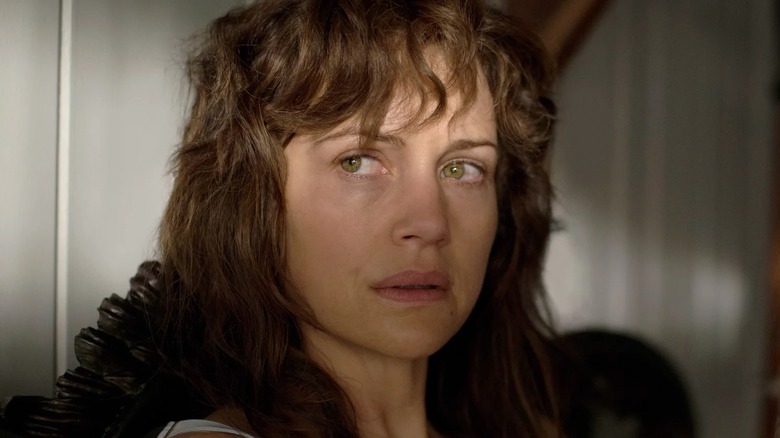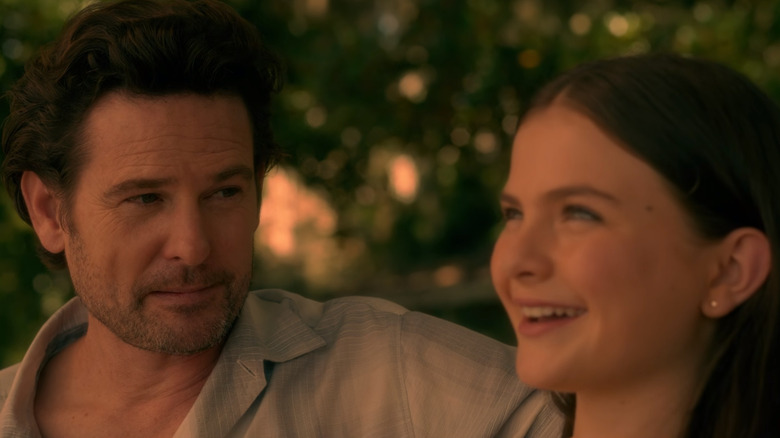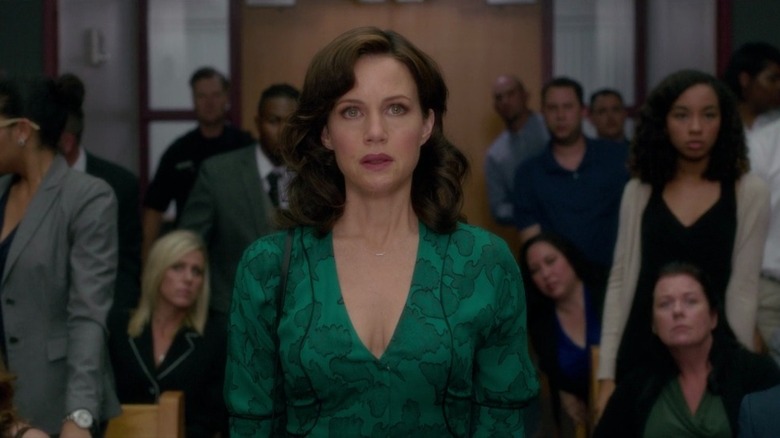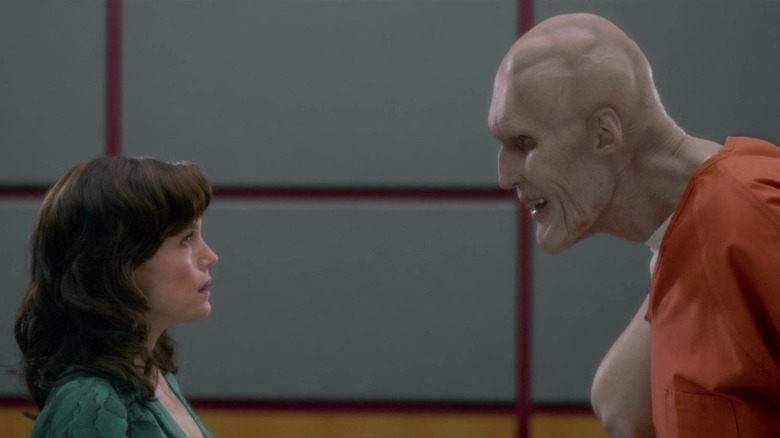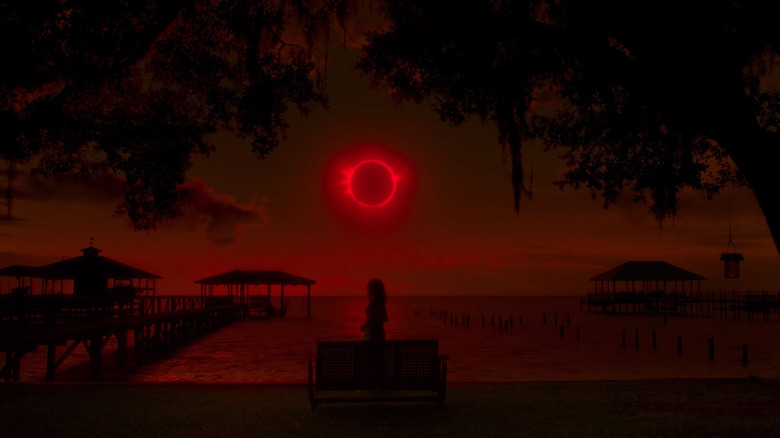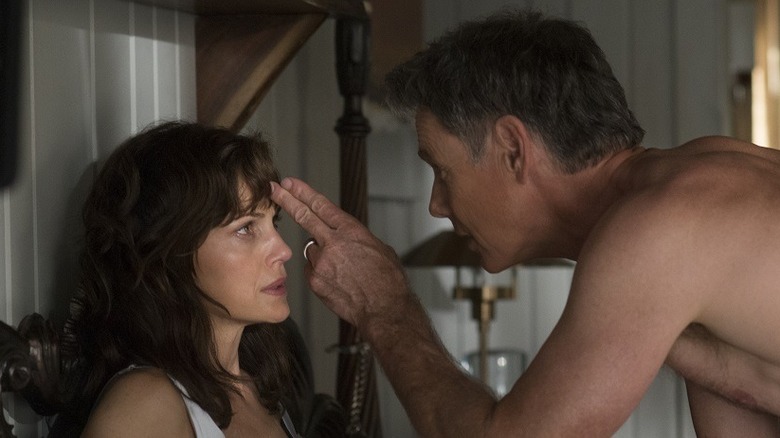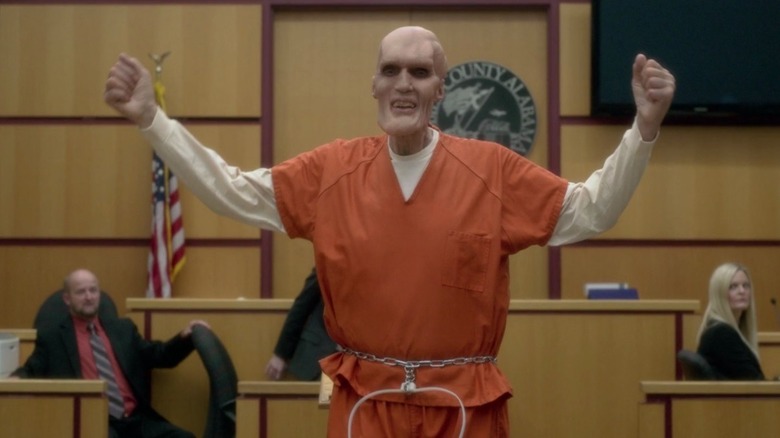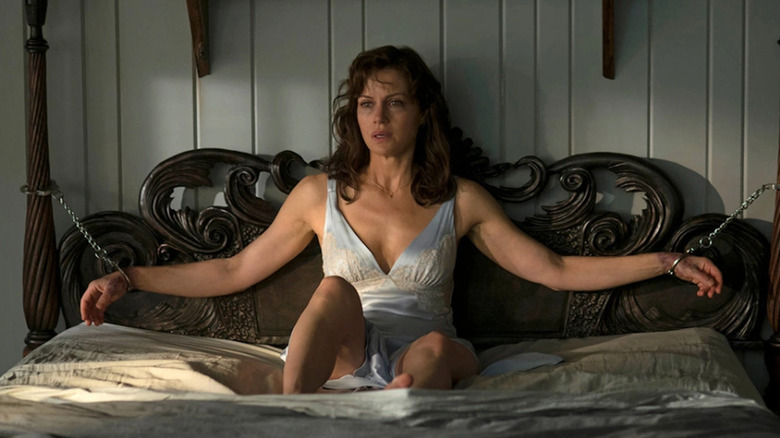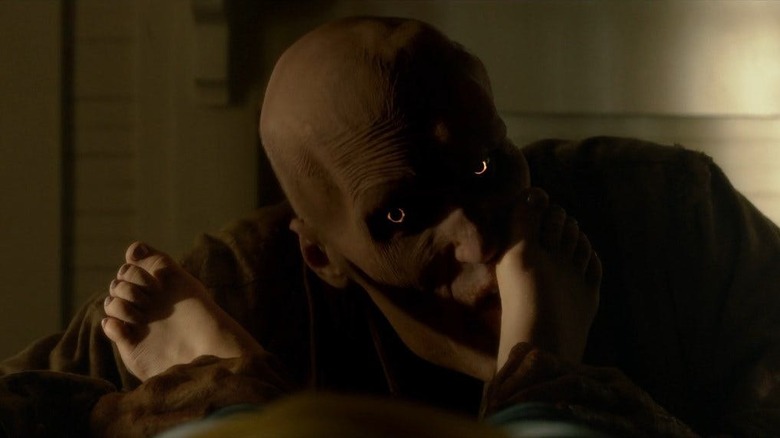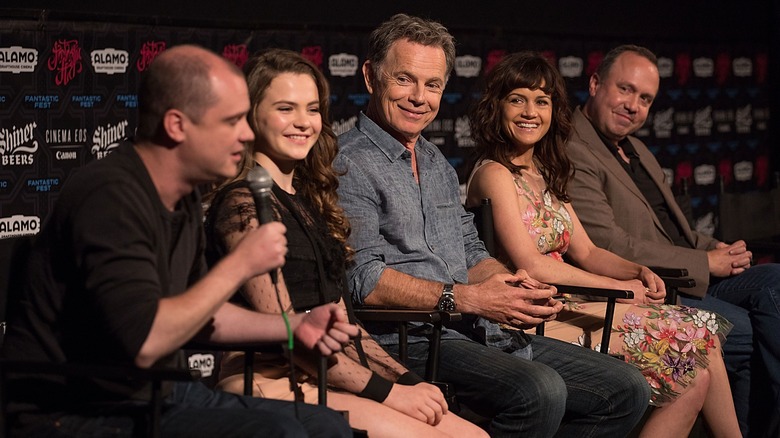The Ending Of Gerald's Game Explained
When "Gerald's Game" hit Netflix in 2017, the internet was abuzz with theories about its plot, its deeper meanings, and especially its ending. Adapted by Mike Flanagan from a seemingly unadaptable Stephen King novel, it starts with as simple a premise as you could possibly get: A woman, Jessie (Carla Gugino), ends up chained to a bed when her husband, Gerald (Bruce Greenwood), drops dead at the worst possible moment. Stranded in the middle of nowhere without another living soul for miles around, she must escape before it's too late.
However, with this being a Stephen King story, things aren't as simple as they seem, and Jessie is beset by ghosts, visions, and traumatic memories. It all culminates in a gruesome finale that had viewers covering their eyes and scratching their heads. If you haven't seen "Gerald's Game," you should probably stop reading now, as we're about to get into major spoiler territory. For everyone who has seen it and still has questions, you're in luck. Let's take a deep dive into the ending of "Gerald's Game," from explanations to Easter eggs and everything in between.
The following article mentions sexual assault. If you or anyone you know has been a victim of sexual assault, help is available. Visit the Rape, Abuse & Incest National Network website or contact RAINN's National Helpline at 1-800-656-HOPE (4673).
What you need to remember about the plot of Gerald's Game
Jessie and Gerald Burlingame have planned a romantic getaway at a remote lakeside house. On the way they nearly run over a stray dog feasting on some roadkill; Gerald shoos the dog away despite Jessie's pleas to help it. They arrive at the house and Gerald prepares for the weekend by popping a viagra. Jessie, meanwhile, grills some expensive Kobe beef for the mutt, much to her husband's consternation. They make their way to the bedroom, where Gerald wants to spice things up by handcuffing Jessie to the bed. He starts to act out a rape fantasy, which makes his wife increasingly uncomfortable. She kicks him away and demands he remove the handcuffs. Gerald grows indignant, and as they argue he suddenly drops dead from a heart attack, leaving Jessie chained to the bed.
Jessie cries for help, but the only one who shows up is the dog, who starts chewing off pieces of Gerald's body. Suddenly, Gerald's ghost appears to taunt her. Jessie also sees a vision of herself talking her through how to survive, including how to drink water from a glass her husband conveniently left on a shelf above the bed. But as Gerald's ghost keeps reminding her, she's got a limited amount of time left, and there's a freakishly tall ghoul known as the Moonlight Man (Carel Struycken) lurking in the shadows, waiting for her to die so he can collect her wedding ring for his trinket collection.
Past traumas come to the surface for Jessie
As she's arguing with her husband's ghost and her spiritual counterpart, Jessie has flashbacks to a traumatic experience from her childhood, one that she's claimed to have forgotten due to amnesia. One summer when she was 12, Jessie and her family traveled to the lake to watch a solar eclipse. While the rest of the family went out on a boat to witness the event, Jessie stayed on land with her dad, Tom (Henry Thomas). While sharing a viewfinder, Tom starts commenting on how much Jessie — who he calls "Mouse" — has grown up, and reminisces about how she used to sit on his lap as a little girl. As the moon fully covers the sun, Jessie agrees to sit on her dad's lap for old time's sake. Tom tells her to keep staring at the eclipse as he touches himself inappropriately.
Later, Tom finds Jessie in her room, and through mental manipulation convinces her not to tell anyone about what happened, especially her mom, as it would only make things worse between them. At dinner that night, Jessie breaks a glass, cutting her hand wide open. Her father wraps a bandage over her wound, telling her he'd hate to have to take her to the hospital and have them sew her fingers back together. That memory sparks something in Jessie that helps her in her current, dire situation.
What happens at the end of Gerald's Game?
Desperate to escape, Jessie hatches a plan that calls upon her past traumas. She retrieves the water glass and smashes it, lodging a giant shard in the shelf above her head. She cuts her wrist with the glass, using her blood to grease the handcuffs. Peeling the skin back, she frees her hand from the cuff and drags the bed towards the bathroom to find the key. Fully free, she bandages her hand, but passes out from the loss of blood. When she awakens, she finds the Moonlight Man waiting for her, and she willingly gives him her wedding ring. She makes her way to her car and drives away, but the Moonlight Man is waiting for her in the backseat, and he whispers in her ear just one word: "Mouse." Jessie crashes the car into a tree, and is rescued by some friendly locals.
Months later, Jessie writes a letter to her 12-year-old self, detailing how she's started a program to help victims of childhood sex abuse. She also learns that the Moonlight Man wasn't a figment of her imagination, but was actually a serial killer who broke into homes to kill people, rape their corpses, and take souvenirs, including body parts from the men. When she confronts the giant Moonlight Man in court, she sees a vision of her father and tells him that he's much smaller than she remembered.
Why did the Moonlight Man spare Jessie?
Throughout her ordeal, Jessie is terrorized by the Moonlight Man, a shadowy figure who looks a lot like the sort of terrifying image our mind creates when we awaken in the dark and see something lurking in the corner. According to Gerald's ghost, this is Death, and he's come to collect something from her after she dies. Jessie convinces herself that he isn't real, only to discover that he's a madman named Raymond Andrew Joubert who's been killing people in their homes at night and mutilating their corpses. Which begs the question: Why would he spare such easy prey as someone chained to a bed?
As news of Joubert's arrest becomes public, Jessie learns a lot about the man who still haunts her dreams: How his enlarged features are due to a medical condition known as acromegaly, that he started off robbing graves before graduating to murder, and that he liked to take various mementos from his victims, including jewels, bones, and body parts. Perhaps most importantly, she learns that Joubert enjoyed raping and mutilating his male victims, which is why she found Gerald was missing his ears while she remained untouched. Perhaps he spared her because he had no interest in women, or maybe it's because she skipped right to the point of his visit, which is giving him something to remember her by (in this case her wedding ring).
Was the dog actually the Moonlight Man?
Early on in the film, Jessie offers some expensive meat to a stray dog that Gerald almost kills with his car. She comes to regret that decision, as the dog ends up chewing on her dead husband like a slab of meat and keeps hanging around waiting for her to die so he can feast on her, too. Jessie awakens to find the Moonlight Man licking on her toes, only to discover that it's actually the dog sampling his upcoming meal. Once she escapes the cuffs, she finds most of Gerald's face is missing, and assumes it was chewed off by the dog, only to later learn that the Moonlight Man has taken pieces of her husband's face as souvenirs.
All things considered, was the dog actually the Moonlight Man? Certainly, Jessie and Gerald encountered a real stray on their way to the lake, and Jessie definitely grilled up some delicious Kobe beef for it. So much of what happens in the room while Jessie is chained to the bed can be chalked up to her panicked imagination — Gerald's ghost teasing her about her impending doom, her alter ego encouraging her to stay alive. So, it's definitely possible that she imagined the dog had returned as a way to ignore what was really happening: Joubert was mutilating Gerald's corpse right in front of her.
How the ending of the movie differs from the book
The 1992 novel upon which "Gerald's Game" is based was long thought to be unadaptable, due to the fact that the title character dies early on and the rest of the story takes place entirely in Jessie's head. As Mike Flanagan revealed in an interview with the Independent, a lot of changes were required to make the book cinematic. "It's a stream of consciousness," the filmmaker said of the story. "The trick for us was trying to make that visually interesting. What we came up with was keeping Gerald in the movie by taking that inner monologue and making it an outer monologue."
This is a major departure from the book, in which Jessie isn't visited by her husband's ghost at all, but instead by a variety of women, including a younger version of herself known as "Pumpkin" and a "Goodwife" version of Jessie who encourages her to stay put and wait for help. She's also visited by a vision of Ruth Neary, a college roommate who almost learned the truth of what Jessie's father did to her on the lake that summer. Once Jessie is free in the book, she writes to the real Ruth, telling her about her past trauma and how it got her through her near-fatal dilemma. Since Ruth isn't in the film, Flanagan has Jessie write the letter to her younger self as an apology.
How does Gerald's Game connect to other Stephen King stories?
If you look closely enough, you'll find all kinds of connections between "Gerald's Game" and other Stephen King stories. The most obvious parallel is with "Dolores Claiborne," another stream-of-consciousness novel that King published in 1992 (and was turned into a 1995 movie starring Kathy Bates and Jennifer Jason Leigh). Like "Gerald's Game," that book's plot hinges on a teenage girl whose father sexually assaulted her during a solar eclipse, and the repercussions that trauma has on her as an adult. Their connection makes total sense when you learn that King originally intended to publish both stories as one novel, which was going to be titled "In the Path of the Eclipse."
The other clear comparison is with "Cujo," King's 1981 novel about a rabid dog terrorizing the residents of Castle Rock, Maine (also turned into a movie in 1983). Although not carrying rabies, the mutt in "Gerald's Game" does terrify Jessie with its ravenous hunger. Aside from that, you can pick up on little lines of dialogue that relate to other King works, most notably his epic series "The Dark Tower." When Gerald's ghost tells Jessie, "Everything dies. All things serve the beam," the beam he's referring to is one of the metaphysical girders that holds up the Dark Tower in that sprawling story.
What the ending of Gerald's Game means
During her long night fighting off death, Jessie is confronted by two warring visions — one of her dead husband telling her she'll never make it, and one of an alter ego encouraging her to survive. As they argue with her and with each other, details begin to emerge about Jessie's past that points to a pattern of behavior on her part: She traps herself in metaphorical prisons because she feels she deserves it, and that's led to her being trapped in a literal one.
When Jessie's father molested her, she convinced herself that she was responsible, which is why she was afraid to tell anyone what happened. Keeping that trauma suppressed caused her to marry an older man who she was always desperate to please, just as she was desperate to please her dad. It's little wonder she allowed Gerald to put the handcuffs on her, despite every instinct telling her not to. The only way she can free herself is to confront her past and finally deal with it. In this way, "Gerald's Game" is a metaphor for how trauma can ruin our lives if we allow it to define us. The ending is all about Jessie coming to this realization.
Why does Jessie confront the Moonlight Man in court?
The other figure who haunts Jessie is the Moonlight Man, who turns out to be both a literal and metaphorical threat to her. Literal in that he's a deranged lunatic who's mutilating her husband's dead body, and metaphorical in that even after she escapes the lakeside house, he still haunts Jessie's dreams and she struggles to determine whether he's real or not. She's particularly disturbed that the police can't find her wedding ring, which she gave to the Moonlight Man in order to avoid his wrath. It all seems to make sense when she learns that he's a living serial killer who, for one reason or another, decided to spare her life, but that doesn't make it any easier to sleep at night. In order to do that, she'll have to confront him face to face.
In the last scene of "Gerald's Game," Jessie goes to the court where Joubert has been arraigned. When she approaches him despite the protestations of the bailiffs, she sees not the Moonlight Man, but her father in shackles and a prison uniform. She looks the giant man up and down and says, "You're so much smaller than I remember." She doesn't mean this literally, but figuratively, as she's built her father into a huge bad guy who dominates her life. It's not until she faces her trauma head-on that she's able to see it for what it is and finally move on with her life.
Why the ending is considered controversial
Ever since it was first published in 1992, the ending of "Gerald's Game" has sparked debate amongst the most devoted of King's readers. The issue stems from the character of the Moonlight Man, referred to in the novel as the Space Cowboy, and the revelation of his true identity in a letter Jessie writes to her college friend Ruth (turned into a letter to her younger self in the film). James Smythe summarized this contention in a 2014 review for The Guardian, part of a longer reassessment of King's work. "The Space Cowboy — a mixture of Jessie's imagination and a real serial killer — is pretty much the strongest example of deus ex machina in his entire oeuvre," Smythe wrote. "The character exists solely to give Jessie the impetus to free herself, and it pretty much ruins the ending."
In Smythe's view, the introduction of the mythical monster spoils what is essentially a tightly-focused inner conflict. "It's a book about a scared woman coming to terms with who she is, what's been done to her, and finding the strength to overcome," he explains. "The Space Cowboy threatens to undo that." Many of these same criticisms carried over into the film adaptation, which is faithful to the book almost to a fault. Would the ending have been more impactful if Jessie had confronted her past and finally processed her trauma without the addition of a giant, semi-supernatural killer? We'll never know.
What did critics say about the ending?
Reviews for "Gerald's Game" were generally positive, with most critics praising Flanagan's ability to make an unadaptable book work cinematically. Though they took great pains to avoid spoiling it, some reviewers couldn't help but comment on the film's climax. "Any diehard King fan will tell you that the author's biggest problem is endings," wrote Brian Tallerico of RogerEbert.com. "His ending for 'Gerald's Game' is atrocious, and you'd be better off turning this off about ten minutes before the credits and just imagining what happens. I'll say this –he [Flanagan] does about as good a job with King's ending as I think he possibly could have, even finding a neat visual trick in the closing scenes that helps tie Jessie's story together thematically."
Eric Kohn of Indiewire had similar problems with Flanagan's fealty to King's source material. "King's fans revere his stories as sacrosanct and so does he," Kohn explained. "So when the movie arrives at a phenomenal, breakneck climax, and then keeps going with a totally implausible twist, it's adhering to the unwritten rule: No matter who's driving, everyone must bow to the King." Though his review was on the whole negative, Alan Scherstuhl of The Village Voice did praise Flanagan's handling of Jessie' escape, writing: "The finale is especially effective, grisly enough that I looked away but thrilling enough that I looked back."
What has the cast and crew of Gerald's Game said about the ending?
In an interview with Bloody Disgusting, Mike Flanagan acknowledged that the book's ending was controversial amongst King fans, though he's always been a fan of it himself. "It was something when I read the book that I loved," he revealed. "I know it was polarizing with fans of the book, so the people that hated that epilogue in the book are going to hate it in the movie." He went on to say that he was sure the ending of the film would be a "lightning rod" among viewers, but he was determined to remain as faithful to the source material as possible. "That's what happened in the book," he said. "There was never a time where it felt right to do the film without that ending, for better or worse."
Flanagan expanded upon his feelings about the ending in an interview with GQ and why he felt it necessary to include it in the movie. He explained that he wanted the Moonlight Man to be seen as "a combination of all of the sickness and all of the diseased maleness that Jessie's been victim to throughout her life, all rolled up into the one tumorous character she could actually confront head-on." He also said that Jessie had "earned that symmetry, to be able to turn around and take a decisive, emotional victory over all of this," and that he knew the finale would likely divide opinion. "I expected it to be polarizing," he said, adding, "I took it as a badge of honor that we must have adapted the book faithfully enough that we're sharing the same complaints."
